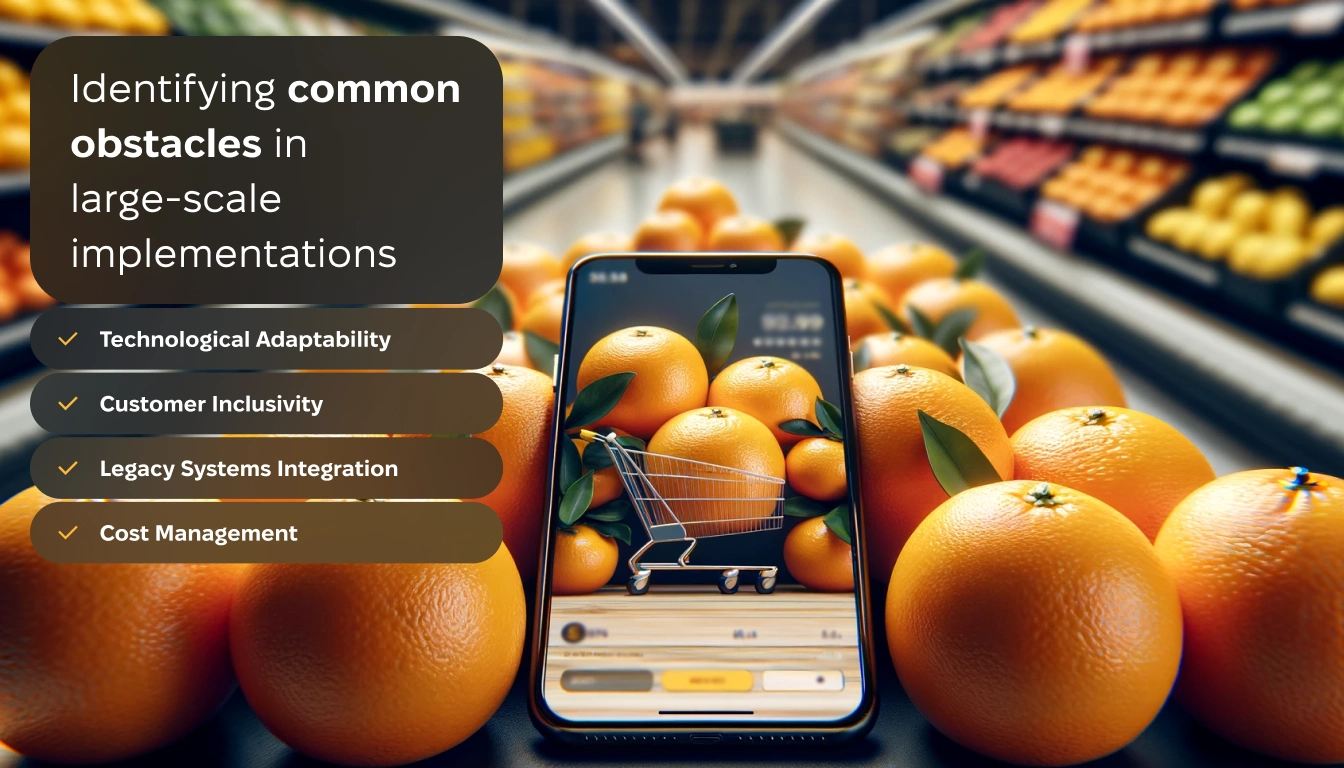Scaling Up: Digital Ticketing Solutions for Large Retail Chains
 1 February 2024
1 February 2024? Listen to the Summary of this article in Audio
As consumer behaviors shift toward more dynamic and technology-driven interactions, large retail chains are recognizing the imperative need to evolve with digital ticketing solutions. The integration of such systems promises to redefine retail experiences, making them more seamless, efficient, and customer-centric. Central to this transformation is the deployment of online ticketing platforms, serving as a fulcrum for enhancing consumer engagement and streamlining ticket management systems. By adopting NFC technology and sophisticated ticket sales platforms, retailers are not only modernizing their operations but are also meeting the eco-conscious and convenience demands of today’s shoppers.
Key Takeaways:
- Adaptation of digital ticketing solutions is crucial for large retail chains to stay competitive in a digital-intensive market.
- NFC technology is a game-changer in streamlining ticket sales and enhancing user experiences.
- Online ticketing platforms are pivotal in improving operational efficiency and reducing environmental impact.
- A robust ticket management system is integral for managing complex customer interactions across various channels.
- Innovative ticket sales platforms can lead to increased customer throughput and a more inclusive journey for all passengers.
Introduction
The retail industry’s landscape is perpetually reshaped by technological innovations, with digital ticketing standing at the forefront of this transformation. In large retail environments, such as expansive department stores and chain operations, the implementation of online ticketing platforms and mobile ticketing services is revolutionizing how customers engage with brands and access services. These e-ticketing solutions are integral to meeting the modern consumer’s expectation for immediate and frictionless interactions, setting new standards in efficiency and convenience.
Overview of digital ticketing in large retail environments
Today’s shoppers demand swift and hassle-free transactions, which has driven a surge in the deployment of digital ticketing platforms across large retail chains. These versatile systems cater to a variety of customer needs, from event access to queue management, and are a vital component in the retailers’ toolkit for enhancing the customer experience. Alongside improving service delivery, these platforms facilitate a refinement in managing customer interactions, all the while compiling valuable data to inform future digital ticketing trends.

As we march past the turbulence wrought by the pandemic, the retail sector continues to push the boundaries of what mobile ticketing services can offer. With a renewed emphasis on safety and convenience, the application of these digital solutions offers customers a range of touchpoints—from in-store product pick-ups to virtual help desks, all anchored by a robust digital ticketing platform.
Automation, speed, and customer-centric design are the pillars of modern e-ticketing solutions. They not only eradicate the need for the cumbersome physical ticketing of yore but also seamlessly bridge the divide between online and in-store shopping experiences. For large retail chains, this integration is no longer a luxury but a necessity to maintain a competitive edge in an increasingly digital marketplace.
Amidst these rapid advancements, the insight gleaned from customer interactions via digital ticketing platforms is becoming invaluable. This data, when leveraged effectively, informs operational decisions and personalizes the shopping experience, making it as agile and responsive as the technology behind it.
In summary, the evolution of digital ticketing solutions is a response to a clear consumer demand for improved retail experiences. Large retail chains can no longer afford to overlook the efficiency, scalability, and enhanced customer engagement that these technologies offer.
The Role of Digital Ticketing in Large Retail Chains
In an age where efficiency and consumer satisfaction are paramount, large retail chains continue to harness the potential of digital advancements to meet these demands. At the core of this technological thrust is digital ticketing, a catalyst for meaningful customer interactions and a streamlined retail operation. Key players in the industry are rapidly adopting cutting edge ticketing solutions to offer unprecedented service levels to their customers, solidifying their position in the competitive retail market.
The introduction of digital ticketing services has been transformative, simplifying ticket sales management and redefining the retail experience. Integration of a comprehensive ticketing system not only benefits the customer but also augments operational agility, creating a harmonious ecosystem that responds adeptly to consumer needs. Convergence of mobile ticketing apps and NFC technology accentuates this revolution, providing scalable solutions that cater to the dynamic nature of large retail operations.
Importance of digital ticketing for efficiency and customer experience
The prevalence of Near Field Communication (NFC) in transport ticketing is one such innovation that mirrors advancements within the retail sector. By implementing a mobile ticketing app with NFC capabilities, customers enjoy a quick and secure tap-and-go entry, leading to reduced lines and waiting times. Integration of these technologies by a ticketing solutions provider not only bolsters the efficiency of the system but also enhances the overall shopping experience, making it smoother and more enjoyable.
A standout advantage of digital ticketing is environmental sustainability. Dematerializing tickets by employing digital ticketing services aligns perfectly with modern eco-conscious values, minimizing waste associated with traditional paper or plastic tickets. However, inclusivity is also at the forefront of the ticketing solutions provider’s mission. Accessibility options within the ticketing system ensure that all customers, irrespective of their digital savviness or banking status, can navigate the retail environment with ease.
Enhanced ticketing system integration within large retail chains is no longer optional; it’s essential. With both effectiveness and client satisfaction hanging in the balance, adopting sophisticated digital ticketing solutions is the clear path forward for any retailer looking to thrive in today’s market.
Challenges in Scaling Digital Ticketing Systems
As large retail chains strive to cater to their digitally-savvy customers, the scaling up of digital ticketing systems presents several formidable challenges. These challenges need to be meticulously addressed to ensure that the implementation of advanced ticket management software, electronic ticketing services, and virtual ticketing solutions is both effective and sustainable. While the benefits of integrated ticketing systems are clear, certain barriers can impede their smooth deployment and functioning.
When it comes to accommodating a diverse customer base, retailers must provide a ticketing experience that is accessible to all, balancing the high-tech expectations of some customers with the need for simplicity and accessibility for others. There’s also the technical complexity of integrating new ticketing APIs with existing legacy systems without disrupting day-to-day operations. Moreover, retailers must navigate the substantial investment in resources and training required to upgrade their network infrastructure to support secure ticketing services and manage these intricate systems effectively.
Identifying common obstacles in large-scale implementations
To pave the way for an efficient and seamless transition to advanced digital platforms, retailers must tackle these common obstacles head-on:
- Technological Adaptability: Ensuring that digital ticketing solutions can evolve alongside rapid advances in technology such as MaaS and Unified Ticketing initiatives.
- Customer Inclusivity: Developing a platform that is user-friendly for all customer segments, irrespective of their technical expertise.
- Legacy Systems Integration: Bridging the gap between outdated infrastructures and cutting-edge digital solutions while maintaining uninterrupted service quality.
- Cost Management: Balancing the financial implications of adopting new technologies with the long-term benefits they bring to operational efficiency and customer satisfaction.
By overcoming these challenges, retail chains can not only ensure smoother operations but also harness the true potential of virtual ticketing solutions.
| Challenge | Impact on Retailers | Strategies for Overcoming |
|---|---|---|
| Technological Adaptability | Pressure to remain cutting-edge in a fast-evolving digital landscape | Investment in scalable infrastructure; ongoing staff training; agile development practices |
| Customer Inclusivity | Need to cater to varying levels of digital literacy | Multi-tiered user interfaces; customer education programs |
| Legacy Systems Integration | Challenges in merging new and old systems without disruption | Incremental integration; leveraging middleware; using flexible APIs |
| Cost Management | Substantial initial investment with long-term return expectations | Phased implementation; cost-benefit analysis; exploring financing options |

Key Features of Scalable Ticketing Solutions
In an era captivated by digital innovation, scalable ticketing solutions have emerged as a cornerstone for growth in large retail chains. These sophisticated systems offer a plethora of essential functionalities that not only streamline ticket transactions but also adapt to the shifting sands of the retail landscape. Embracing these e-ticketing systems means a retail chain can confidently handle high volumes of transactions with ease while enhancing the overall customer experience.
Essential functionalities for large retail chains
As large retail chains expand, their digital ticketing solutions must include features that support scalability and adaptability in an ever-changing market. Essential functionalities involve a blend of versatile compatibility, integration prowess, and a commitment to industry standards that ensure resilience and relevance within the supply chain.
- High Volume Transaction Handling: With countless transactions occurring daily, digital ticketing solutions must be equipped to process ticket sales without a hitch, ensuring efficiency and consistency in customer service.
- Secure Payment Processing: Security is non-negotiable in the realm of ticket sales software. Systems must protect sensitive data with robust encryption and compliance with industry security standards.
- Device and OS Compatibility: In our multiplex world, ticketing systems need to function seamlessly across various devices and operating systems, providing a uniform experience whether accessed via mobile ticketing solutions or desktop platforms.
- Integration with Other Systems: A siloed system is a thing of the past—modern e-ticketing services must integrate fluidly with CRM, inventory systems, and even social media for promotional tie-ins, creating a unified retail ecosystem.
- Standards and Industry Engagement: E-ticketing systems must adhere to established standards, and providers should be actively engaged in discussions about the evolution of the industry. This ensures that systems remain up-to-date and can scale appropriately with advancing technologies.
The throughput of transactions, combined with security and flexibility, enables digital ticketing platforms to support the vast ecosystem of large retail chains effectively. By focusing on these key features, retailers can elevate the shopping experience to new heights and pave the way for future expansion and innovation.
Case Studies: Successful Implementations
The implementation of comprehensive digital ticketing solutions in large retail chains showcases the transformative impact of technology on the customer experience. Such implementations have led to increased operational efficiencies and customer convenience that redefine service standards. Let’s look at some of the most noteworthy success stories from the industry.
Examples of large retail chains with effective digital ticketing
One of the most prominent examples of effective digital ticketing implementation in a large retail setting is Japan’s JR East. This major transit authority embraced Near Field Communication (NFC) technology not just for its primary purpose of transit ticketing but for additional services that exemplify the multifunctional capabilities of NFC. JR East’s digital ticketing platform has extended to serve as digital keys for hotels or office spaces, representing a vision where ticket management solutions dwarf traditional uses and branch into comprehensive service offerings.
This successful deployment underscores the versatility and potential of event ticketing systems when combined with NFC technology. Such event registration software provides an intuitive experience for users and can be adapted further for retail applications, granting unparalleled convenience in access and utility.
Another testament to the efficacy of e-ticketing software is seen in the seamless integration of digital ticketing platforms within both the sales and service segments of these chains. Through operational refinements, these platforms prove that a digital ticketing platform is not just a facilitator of transactions but also a crucial tool for enhancing the modern consumer’s shopping journey.

These case studies offer valuable insights into the real-world applications and advantages of advanced ticket management solutions, proving that a strategic approach towards digital ticketing can lead to notable improvements in efficiency, scalability, and overall customer satisfaction.
- Reduced wait times and increased throughput via mobile and NFC ticketing solutions create a smoother customer flow.
- Operational efficiency gains with event ticketing systems that speed up transaction times and minimize overhead.
- The ability to offer a variety of services through an integrated event registration software platform increases customer touchpoints and convenience.
- Eco-friendly digital transitions facilitated by e-ticketing software align with sustainability goals.
The progression of digital ticketing not only meets the current demands of consumers but also strategically positions retail chains for future technological developments and consumer expectations.
Integrating Ticketing with Other Retail Systems
The seamless integration of digital ticketing systems with other core retail management functions is no longer a luxury but an imperative for large retailers. The fusion of ticketing technology with systems like Customer Relationship Management (CRM) and inventory management leads to a harmonious synergy that can result in increased efficiency and elevated customer experiences. This integration ensures real-time data flow across different platforms, allowing for immediate and strategic decision-making. Further refinement of this interconnectedness is critical for retailers to navigate the competitive tides of modern commerce.
Importance of seamless integration with CRM, inventory, and other systems
Integrating digital ticketing solutions, such as online ticketing platforms and ticket sales platforms, with CRM and inventory systems empowers retailers to unlock a new plane of customer engagement and inventory efficiency. The key lies in the ability to translate customer interactions and preferences captured through ticketing interfaces into actionable insights within CRM, thus refining marketing strategies and customer service protocols.
The impact on inventory management is equally transformative. Linking ticket sales to real-time inventory data paves the way for precise stock control, ensuring that demand is met proactively and effectively. As a ticketing trend gaining significant momentum, this bidirectional sharing of information is becoming a pillar for robust retail systems.
Below is an analysis of how integrated ticketing systems influence CRM and inventory management, delineating the convergence of these technological domains.
| Integration Aspect | Impact on CRM | Impact on Inventory Management |
|---|---|---|
| Customer Data Flow | Personalizes marketing campaigns based on ticketing behaviors | Tracks product popularity and optimizes stock levels accordingly |
| Operational Analytics | Improves customer segmentation and targeting | Enables dynamic pricing strategies based on sales velocity |
| Real-Time Data Exchange | Enhances customer support with up-to-date interaction records | Reduces out-of-stock scenarios through automated replenishment triggers |
| Cross-Platform Accessibility | Facilitates omnichannel customer journeys | Aligns online and offline inventory records for accurate reporting |
| Feedback Collection | Guides product development with direct customer insights | Informs procurement strategies and supplier negotiations |
For retailers to stay at the forefront of digital ticketing trends, adopting an agile ticket sales platform that can effortlessly mesh with these critical retail systems is essential. Providers of innovative ticketing solutions must delicately balance flexibility, scalability, and user-friendliness to appeal to a wide spectrum of retail clients demanding such sophisticated integrations.
Ultimately, an ecosystem where online ticketing platforms communicate seamlessly with CRM and inventory management systems is not only desirable but necessary for the successful operation of large retail chains. The key to unlocking the full potential of digital ticketing lies in an understanding that it is a synchronistic component of an all-encompassing retail system, rather than an isolated function.
Security and Compliance at Scale
In the fast-evolving landscape of retail technology, the expansion of digital ticketing solutions necessitates stringent security and privacy measures. As large retail chains integrate sophisticated ticketing APIs and mobile ticketing apps into their operations, the imperative to safeguard sensitive customer information has never been greater. It is critical that these systems not only meet but exceed the high-security standards expected by consumers and regulatory bodies alike.
Handling data security and privacy in large-scale systems
To address these concerns, retailers must implement digital ticketing services that embody secure ticketing services, complete with encryption, secure access controls, and regular security audits. This ensures the integrity of both consumer and network data across all digital touchpoints and instills confidence in the ticket sales management process.

Furthermore, compliance with relevant data protection regulations, such as GDPR and CCPA, is non-negotiable, ensuring that customer data is processed, stored, and used within the legal frameworks designed to protect individual rights. The role of NFC technology, in particular, must be scrutinized to ensure its alignment with established security protocols to prevent any potential data breaches.
| Aspect | Requirements | Benefits |
|---|---|---|
| Encryption | State-of-the-art encryption methods for data at rest and in transit | Protects sensitive customer information from unauthorized access |
| Access Controls | Strong authentication and access management policies | Limits data access to authorized personnel, reducing insider threat risk |
| Security Audits | Regular and comprehensive security assessments | Identifies vulnerabilities and ensures continuous security enhancements |
| Data Protection Compliance | Adherence to global and local data protection laws | Maintains legal compliance and cultivates consumer trust |
| NFC Protocols Alignment | Implementation of secure NFC standards and technologies | Secures NFC transactions and prevents data interception |
As retailers continue to advance their digital footprint, the incorporation of robust secure ticketing services and digital ticketing services must evolve in lockstep. Ensuring the security and privacy of large-scale systems not only upholds the reputation of the brands but also strengthens the industry’s ability to deliver a secure and seamless ticketing experience.
Training and Support for Staff and Customers
The cornerstone of a seamless transition to digital ticketing solutions in large retail chains lies not only in the adoption of cutting-edge technologies such as mobile ticketing solutions and e-ticketing systems but also in the comprehensive training and support provided to staff and customers. Through tailored educational programs and responsive customer support, retailers can catalyze the smooth adoption of ticket sales software and ensure ongoing satisfaction.
Ensuring smooth adoption through training and support
Implementing e-ticketing services demands a dual-faceted approach: equipping staff with the necessary expertise to manage these systems and enlightening customers on how to utilize them effectively. Employee training programs must be designed to cover all functionalities of the ticket management software to empower the workforce in facilitating customer transactions and troubleshooting common issues.

Simultaneously, customers should be provided with intuitive guides and support channels that can assist them as they navigate new mobile ticketing solutions. Education materials, such as easy-to-understand tutorials and FAQs, contribute significantly to customer empowerment and self-sufficiency, augmenting their experience with the digital ticketing platform.
Investments in training and support services echo throughout the customer lifecycle, resulting in amplified efficiency, brand loyalty, and a reduction in potential friction during the adoption of new ticketing tools. The following comprehensive table illustrates the key elements of a successful training and support strategy.
| Training & Support Element | Objective | Method | Outcome |
|---|---|---|---|
| Staff Training Programs | Educate employees on the digital ticketing system | Interactive workshops, webinars, and manuals | Skilled workforce capable of handling ticketing queries |
| Customer Support Channels | Facilitate ease of use and problem-solving for end-users | 24/7 help desks, chatbots, and hotline services | Reduced user errors and enhanced satisfaction |
| Educational Materials for Customers | Empower customers to independently use e-ticketing systems | User guides, video tutorials, and in-app assistance | Self-sufficient users and lowered support requests |
| Feedback Collection Mechanisms | Improve and refine training and support systems | Surveys, focus groups, and usage analytics | Continuous improvement in training and support offerings |
By fostering an environment rich in knowledge and support readiness, retail chains can navigate the digital transformation with confidence. The culmination of these efforts is a notable increase in the efficiency and effectiveness of ticket sales software, echoing through the enhanced experiences of both customers and the retail staff who serve them.
Evaluating and Choosing the Right Solution
Identifying the optimal digital ticketing solution for a large retail chain involves navigating a labyrinth of market offerings, each promising to be the keystone for customer engagement and operational efficiency. To demystify this selection process, we delve into the key criteria that spearhead the decision-making journey and assure alignment with a retailer’s strategic trajectory.
Criteria for selecting a digital ticketing solution for large chains
For retailers seeking ticketing solution providers, the labyrinth isn’t threaded without a precise set of criteria tailored to their intricate needs. The engine driving the digital transformation includes user-centric designs, versatility, and the seamless interoperability of ticketing technology with an enterprise’s existing fabric.
The right event registration software should not only be a conduit for processing sales but also a gateway for gathering insightful data across various customer touchpoints. It should be an embodiment of digital ticketing trends, sculpting the shape of consumer interactions well into the future.
A retailer’s vision, scale, and the heterogeneous computing landscapes determine the anatomy of the preferred system laid out in the following parameters:
- Scalability: A ticket sales platform must accommodate growth, effortlessly embracing enhancements and adapting to evolving digital ticketing trends without missing a beat.
- Integration capabilities: Cohesive interplay with the retailer’s existing ecosystem, including CRM and POS systems, ensures uninterrupted operations during and post-integration.
- Support diversity: The pursuit of a solution includes asserting latitude in supporting a broad spectrum of devices and operating systems, from iOS to Android and beyond.
- User-experience focus: The selected platform must streamline operations and elevate user experiences, consolidating the retail brand as a consumer favorite.
- Future-proof flexibility: In an industry whelmed by incessant innovation, the chosen ticketing technology should be nimble and adaptable to impending digital currents.
Acknowledging these criteria, retailers are better positioned to rally behind a ticketing solution fortified to face the rigors of large-scale deployment and the evolving demands of the consumer populous.
Future Trends in Digital Ticketing for Retail
As retail chains continue to adapt to the digital-first world, emerging technologies are heralding a new era in digital ticketing trends, set to deepen the integration between the physical and digital shopping realms. These innovations mark a significant shift in how retailers will engage with customers in the near future, leveraging the latest advances in event ticketing systems and virtual ticketing solutions. Ai-driven personalization, immersive experiences through extended reality (XR), and the Internet of Things (IoT) are just a few examples that present exciting prospects for the retail industry.
Emerging Technologies and Their Potential Impact
Advanced AI algorithms are expected to drive digital ticketing platforms to new heights by offering personalization at an unprecedented scale. Combined with machine learning, these platforms will be able to analyze customer purchase histories and preferences to tailor offerings in real-time, contributing to a surge in e-ticketing software efficiency and customer satisfaction.
With the ongoing maturation of XR technologies, retailers can now consider integrating these into their digital ticketing platform. Customers could soon expect virtual try-ons, interactive product demonstrations, and even virtual store tours, ushering in a new wave of experiential retail that blends the convenience of online shopping with the engagement of in-store visits.
IoT-enabled smart stores are bringing a new dimension to digital ticketing solutions by enhancing in-store experiences. These smart systems can track customer movements and interactions, allowing for personalized service delivery and precise inventory management.

The surge in blockchain technology assures heightened supply chain transparency and product authentication, which could be a game-changing factor for digital ticketing trends, particularly in the context of warranty and authenticity checks within a digital ticketing platform.
Furthermore, as we anticipate the rollout of 6G technology, its projected speed and data handling capabilities will no doubt open up revolutionary possibilities for virtual ticketing solutions, potentially transforming every touchpoint of the customer experience.
With such technologies at the cusp of becoming mainstream within the retail sector, a plethora of opportunities await retailers who strategize to capitalize on these virtual ticketing solutions. The convergence of AI, XR, and IoT, along with the formidable speed potential of 6G, positions digital ticketing not just as a transactional tool but as a comprehensive gateway to unmatched retail experiences. Retailers aligning with these advancements will be at the forefront, setting digital ticketing trends and shaping the landscape of customer engagement for years to come.
| Technology | Impact on Digital Ticketing | Benefit for Retail |
|---|---|---|
| Advanced AI & Machine Learning | Personalization of customer experiences | Increases customer satisfaction and loyalty |
| Extended Reality (XR) | Enhances the immersive aspect of shopping | Attracts and retains tech-savvy customers |
| IoT-Enabled Smart Stores | Real-time data for tailored services | Improves in-store efficiency and personalization |
| Blockchain Technology | Ensures transparency and product authentication | Builds trust and authenticity in brand offerings |
| Anticipation of 6G Technology | Ultra-fast data processing capabilities | Enables real-time, high-volume customer interactions |
As these cutting-edge technologies continue to develop and integrate, the future of retail digital ticketing presents an inspiring outlook. Retailers who embrace these trends will find themselves well-equipped to offer experiences that go beyond mere transactions and enter the realm of engaging, memorable interactions.
Conclusion
The wave of digital transformation sweeping through retail has led to one undeniable cornerstone of success: scalable digital ticketing solutions. For large retail chains, the key to future-proofing their operations lies in the implementation of advanced ticketing systems that cater to the heightened expectations of a convenience-driven consumer base. The terrain of retail is challenging, unpredictable, yet ripe with opportunity for those who embrace innovation and streamlined digital solutions such as ticket sales management and electronic ticketing services.
Summarizing the Importance of Scalable Digital Ticketing Solutions
The crux of scalable digital ticketing solutions lies not only in their ability to facilitate seamless transactions but also in their role as a fulcrum for invaluable customer insights and engagement. Online ticketing platforms have graduated from mere transactional utilities to robust ecosystems that encompass a holistic retail strategy, incorporating ticket sales management and elevating the overall user experience. Retail chains that are quick to integrate these systems will find themselves at the vanguard of the industry, leveraging convenience, speed, and personalized service to differentiate themselves in a crowded marketplace.
Incorporating mobile ticketing services into the retail strategy underpins a seamless and agile response to customer needs. As the industry gravitates towards a more interconnected and data-driven approach, the synergy between electronic ticketing services and other vital systems—like inventory management and CRM — becomes a lynchpin for operational excellence. This holistic integration, coupled with rigorous security and compliance, underwrites the trust and satisfaction customers place in their preferred retail brands.
To sum up, the adaptation and meticulous implementation of digital ticketing solutions signal a pivotal shift in modern retail, promising a more dynamic, efficient, and customer-friendly future. As retail chains prepare to navigate a landscape defined by innovation and consumer preference, the marriage of technology and personalized service presented by digital ticketing solutions will stand as a beacon of progressive retail management.
FAQ
What are the primary benefits of digital ticketing solutions for large retail chains?
Digital ticketing solutions streamline operations, improve efficiency, and enhance the customer experience. They reduce waste from physical tickets, increase transaction speed and convenience, and enable easier ticket management across digital channels.
How does NFC technology impact digital ticketing in retail?
Near Field Communication (NFC) technology is at the forefront of digital ticketing trends, offering fast, contactless transactions that enhance the customer experience through easy tap-and-go payments, flexible travel options, and seamless integration with existing systems.
What are some challenges faced when scaling digital ticketing systems in large retail chains?
Challenges include addressing a diverse customer base, integrating with legacy systems, managing investment requirements for technological upgrades, and ensuring systems are adaptable to evolving digital trends such as MaaS and Unified Ticketing initiatives.
What functionalities should scalable ticketing solutions have for large retail chains?
Scalable ticketing solutions should support high-volume transactions, secure payment processes, and interoperability with various devices and platforms. They should also be capable of integrating with CRM, inventory management systems, and conform to industry standards for supply chain resilience.
Can you provide examples of successful digital ticketing implementations?
Many transit authorities and retail chains have effectively implemented digital ticketing platforms. For example, JR East in Japan uses NFC for various services, showcasing the operational efficiency and customer convenience possible with sophisticated digital ticketing solutions.
How important is the integration of ticketing systems with other retail systems like CRM?
Seamless integration is critical for creating a cohesive retail environment. It enhances the customer experience by providing a consistent shopping journey and facilitates real-time data exchange for inventory and customer relationship management.
What measures ensure data security and privacy in digital ticketing solutions?
Digital ticketing solutions must comply with high-security standards and data protection laws. Implementing technologies like NFC requires alignment with established security protocols to safeguard consumer and network data from breaches.
Why is training and support crucial for digital ticketing systems?
Comprehensive training programs for staff ensure they can effectively use and manage the digital ticketing platform. Customer support is also vital to assist users during the transition to new ticketing technologies and to maintain customer satisfaction.
What criteria should be considered when choosing a digital ticketing solution?
Large retail chains should evaluate the solution’s adaptability to future trends, ease of integration with existing systems, operational streamlining capabilities, device compatibility, and scalability to accommodate future growth and technology improvements.
What future trends are likely to influence digital ticketing in the retail sector?
Emerging technologies such as AI, XR, IoT for smart stores, and hyper-personalization are set to further enhance customer engagement and personalization. Innovations like blockchain and the advent of 6G technology also indicate rapid technological advancements that retail can leverage for a redefined shopping experience.










